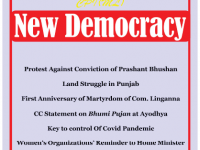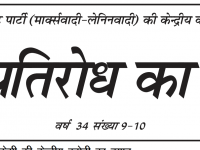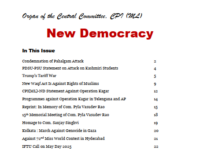While Bihar assembly elections held recently have delivered a massive defeat to Narendra Modi led RSS-BJP at the Centre, they also showed that the basic issues facing the people did not become the main issues in the elections. It shows the success of the ruling classes and the big media controlled by them in allowing only certain issues to reach the people at large. Despite big increase in the role of corporate media, a large number of people (nearly 24%) did not vote for the candidates fielded by the claimants to power i.e. Grand Alliance of RJD, JD-U and Congress and NDA of BJP, LJP, RLSP and HAM-S. Over 2.5% rejected all the candidates by stamping NOTA and 9.4 percent voted for independent candidates. This shows that disillusion with main claimants to power runs deep despite massive dose of propaganda to make it a direct contest and polarize the voters between main contestants for power.
Bihar assembly election results have given a big blow to the murderous attacks by the RSS-BJP against minorities, particularly Muslims and the murders and intimidation of rationalists and intellectuals opposing the fascist trends by little known fanatical organizations linked to RSS. A large number of intellectuals have come forward to condemn these attacks and their return of awards has focused attention on this danger.
While BJP led NDA’s loss could be attributed to coming together of RJD, JDU and Congress, the important thing is a sharp decline in the vote share of BJP to 24.3% compared to 29.8% in parliamentary elections of 2014. The vote share of NDA also dropped sharply despite inclusion of Jitan Ram Manjhi’s outfit which was not part of NDA during parliamentary elections. It shows growing disillusionment of the people with the performance of BJP Govt. at the Centre. On all promises to the people like controlling the prices of essential commodities, generating a million jobs every month, bringing back black money and curbing corruption etc. the nearly year and a half rule of Modi Govt. has been a dismal failure. People who were hoodwinked by Modi with the help from the corporate media on his slogan of development such as ‘sabka sath sabka vikas” could see the reality of Modi led RSS-BJP govt.’s rule. On the other hand, to distract the people’s attention from these failures and to disrupt the people’s unity against anti-people policies being pursued by their Govt., RSS-BJP hordes have intensified their communal drive, attacking minorities and killing Muslims on different pretexts, killing and intimidating intellectuals opposing superstitions and religious bigotry and packing all the statutory bodies relating to education, historical research, art, cinema & culture, science and scientific research with nominees of RSS who have little calibre and enjoy scant respect among peers. In Bihar sensing its imminent defeat, RSS-BJP tried very hard to communally polarize the electorate. However, the ploy did not work. RSS Chief Mohan Bhagwat’s statement of the need for a review of ‘reservations’ by experts, which was meant to consolidate upper castes, also backfired with RJD and JDU rallying backwards and dalits against these attacks on reservation.
BJP Govt. is doing everything to attract FDI, further opening up different sectors of economy for foreign capital. Though the Govt. is claiming high growth rate, the conditions of the people, particularly of the workers and peasants, are deteriorating. Corporate media had misled the people of the country into believing that Modi Govt. would improve their conditions but there is no inkling of ache din in its eighteen months of its rule.
The Grand Alliance, which has come to power in these elections, consists mainly of the regional parties which have been in power for last 25 years and Congress as their junior ally. These parties do not represent any change in the policies being pursued by the successive govts. in Bihar. The question of carrying out land reforms and giving land to the landless poor peasants and agricultural labourers is not on their agenda though it is the most important issue in improving the lot of rural poor and even in fighting caste oppression in Bihar. It should not be forgotten that Nitish Kumar Govt. had thrown D. Bandopadhyay Commission report on the land question into the dustbin. Nearly 88% of the people of Bihar live in villages which have witnessed economic stagnation and continue to be backward. There is no programme for developing industries in Bihar. Grand Alliance’s Chief Ministerial candidate Mr. Nitish Kumar has cultivated an image of a ‘man of development’ and good governance, most of it during his alliance with BJP. While his development is limited to construction industry, his ‘good governance’ has involved giving free reins to bureaucracy and strengthening the repressive machinery including police forces.
This election has also put some spring into Congress which had been waiting for long to anoint Rahul Gandhi as its leader. This party had faced large scale rejection due to its anti-people policies and widespread corruption.
Like the earlier assembly elections in 2010, this time also the revisionist parties contested these elections together. While the vote share of three of them, CPI, CPI(ML)-Liberation and CPM, decreased from nearly 4 percent in 2010 (CPI 1.7, Liberation 1.6 and CPM 0.7) to 3.5 percent in 2015 (Liberation 1.5, CPI 1.4 and CPM 0.6), they could secure 3 seats this time (CPI(ML)-Liberation) as compared to one last time (CPI). This election shows continuing electoral marginalization of these parties, particularly of CPI which used to be a significant electoral force in the past.
The corporate media has projected the contest as between the development models of Modi and Nitish. However, both these models are dependent on foreign capital and involve giving largesse to corporate including domestic corporate. In fact there has been continuous attempt by the ruling classes to insulate the economic policies which are mainly responsible for the people’s adverse conditions from the anger of the people which is building up over the effect of these policies. It is to be recalled how the corporate and the media controlled by them had projected Modi led Govt. as an answer to the problems of the people and corruption as the main issue before 2014 elections though it is intimately connected to the economic policies pursued by the successive govts. The same forces are now again trying to sideline the issue of economic policies. However, distress and anger of the people grows but it needs developing of people’s struggles on these issues and strengthening of revolutionary forces to prevent diverting this anger into communal channels and false choices.
Bihar elections once again highlight the importance of developing revolutionary movement and struggles of workers and peasants. It also points out the need to mobilize the people against communalism, particularly majority communalism, and against caste oppression and to make these struggles part of the struggle for new democratic revolutionary transformation of the country.
Central Committee, CPI (ML)-New Democracy
November 11, 2015


